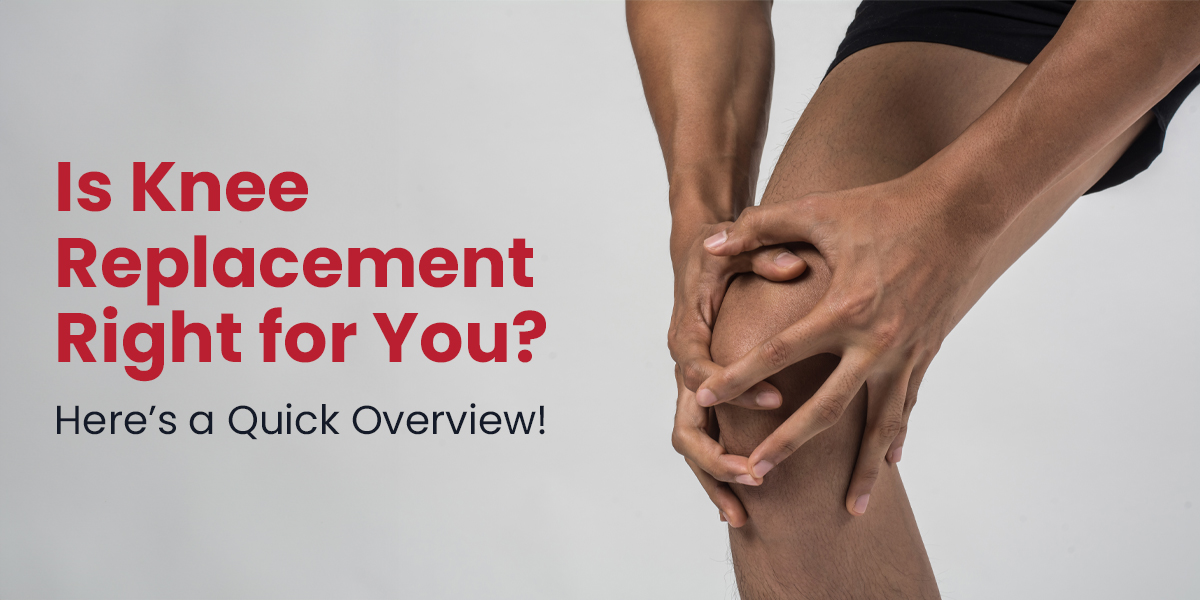Is Knee Replacement Right for You? Here’s a Quick Overview

Did your doctor advise you to go for knee replacement surgery recently?
If yes, many questions might be hovering in your mind. But do not worry! Read this blog till the end to understand the importance of making an informed decision when opting for knee replacement.
Things to Know Before Undergoing Knee Replacement Surgery?
Knee replacement surgeries are advised for worn-out or injured knee joints. It helps you ease your pain and make your knee work better than before. While undergoing a surgical correction, your damaged bone and cartilage will be replaced with parts made from High density poly and metals.
Knee replacement is not for all suffering from knee issues. Your surgeon will check your motion range, strength, and stability to decide whether you are the right candidate for knee replacement surgery. X-rays give your surgeon a clear picture of how extensive your damage is.
Your pick of artificial joints and surgical techniques is based on your age, weight, physical activity, knee shape and size, and overall health.
Why are Knee Replacement Surgeries Done?
The first and foremost reason for undergoing knee replacement surgery is to ease the pain while walking caused by arthritis. If your doctor advised you to have knee replacement surgery, you might be struggling with issues related to walking, climbing stairs, and getting off your chairs.
If only one part of your knee is damaged, your surgeon will only replace it. However, if your entire knee is damaged, you will need a whole replacement. Your artificial parts are inserted in the soft central part of your knees.
Suggested Read: Say Goodbye to Joint Pain: Top Tips for Relief and Prevention
Signs Indicating You Need A Knee Replacement Surgery
Here are some key signs to know that you are in need of a knee replacement surgery –
- You have arthritis – either rheumatoid arthritis or osteoarthritis
- Your pain does not allow you to do your regular chores
- The pain is severe even in the resting position
- You have swollen and deformed knees
Tests to Perform Before Undergoing A Knee Replacement Surgery
Before undergoing a knee replacement surgery, here are a few tests that your doctor might ask you to do –
Medical evaluation
Your doctor will first assess your physical symptoms related to knee motion, strength, and alignment.
Blood tests
These blood tests are vital for understanding the conditions underlying your bones and soft tissues. It is also important to evaluate if a person is anemic or has any clotting disorders. It is related to the fitness of patient for anesthesia while undergoing surgery.
X-rays
X-ray examinations help your doctors understand the extent of damage and deformity you have suffered.
Other Imaging Tests
You may be asked to undergo an MRI (magnetic resonance imaging) or a CT scan (computed tomography).
Get in touch with the best ortho doctor in Kanpur & Lucknow for a positive knee replacement surgery experience.
How Should You Prepare for Your Knee Replacement Surgery
You need to follow a few preparatory tips before your knee surgery as discussed below:
- Your surgeon will advise you to stop certain medicines and dietary supplements you might otherwise be regularly consuming.
- Your diet after midnight on the day of your surgery will be restricted.
- Avoid smoking and drinking.
- Identify your caretaker.
Exercises For Preventing Your Knee Damage
Here are some exercises to keep your knee health intact –
Leg Stretches
Sit down on your yoga mat and spread out your legs straight in front of you. Bending one knee towards your chest, slowly slide your foot along the floor. Hold this position for around 5 seconds and keep repeating the same stretch 10 times with each leg.
Leg Extensions
Start your leg extensions with a 5 lb weight and gradually increase it to 10 lb.
Side planks
This is one of the best exercises for preventing your knee injuries.
Bridge
This is a joint pilate exercise that strengthens your back and works on your knee pain.
Standing Calf Stretch & Quadriceps strengthening exercise
This exercise targets your lower leg muscles along with your calf muscles.
Bottom Line
Most people have significantly benefited from knee replacement surgery. Their mobility improved after their surgeries, thereby facilitating their ability to lead a quality life. Usually, these knee replacement surgeries are expected to last for 20 to 25 years.
Once you have recovered, you can indulge in physical activities such as swimming, walking, biking, and golfing. Your surgeon is your best support for guiding your physical activities post-knee replacement surgery.

 Call-an-Ambulance
Call-an-Ambulance



